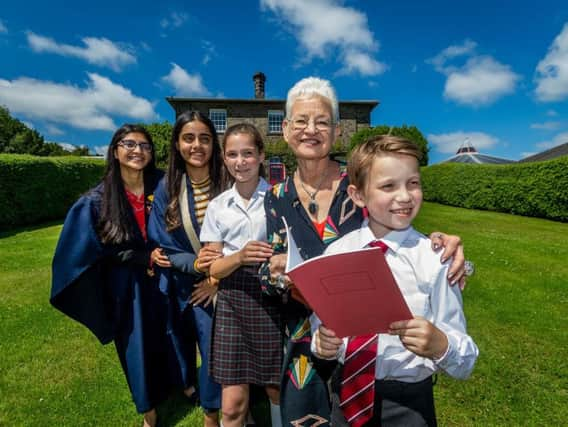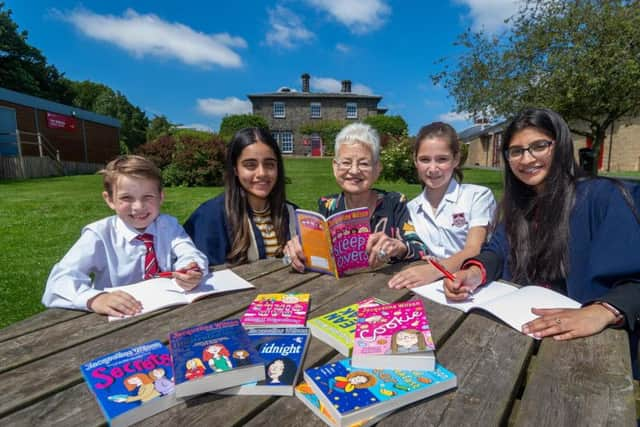Jacqueline Wilson on how pressures of childhood are greater than ever


The experience of childhood is one that is continuously changing, shaped by shifting societal norms and cultural fashions - not forgetting the technological developments that define each era in modern Britain.
It is difficult for any adult to keep up, but, in a writing career spanning five decades, children’s author Dame Jacqueline Wilson has managed it, her books not only resonating with young readers of the day but many also standing the test of time and proving to be page-turners across several generations.
Advertisement
Hide AdAdvertisement
Hide Ad

“I talk to children a lot and I get lots of emails from young readers so I hope I’m reasonably on the ball with the way children think,” she says. “I have to be a bit careful though. I don’t want to be too up to the minute as I don’t want, in my work, to be the equivalent of dad dancing - somebody trying to be really trendy and making people cringe.
"It’s easier when I’m writing my Victorian books because then I feel I know what I’m doing - and even if I don’t, nobody can prove me wrong.”
Changing childhood
Advertisement
Hide AdAdvertisement
Hide AdNow 73, Dame Jacqueline wrote her first ‘novel’ when she was nine, filling countless Woolworths’ exercise books with her tales as she grew up. As a teenager, she started work for a magazine publishing company, going on to become a journalist for Jackie magazine before turning her hand to writing novels full-time. Ricky’s Birthday became her first book to be accepted for publication, back in the early 1970s.
“I think deep down, childhood is exactly the same,” she says. “Children worry about the same things and giggle over the same things and stress when they haven’t got a best friend.
"But I do think there are more pressures on children now. I think it’s wonderful that girls now are expected to strive academically and be strong and sporty but also they care about the way they look. It’s as if you have to get ten out of ten in all respects and I do think that must be so difficult.
“You can’t help feeling that social media and photoshopped images on Instagram must be a bit depressing when you’re an adolescent say and going through a bit of a lumpy stage or a spotty stage so I do think it is perhaps harder to be a young person today.
Advertisement
Hide AdAdvertisement
Hide Ad"In some ways, I think young people are more knowledgeable about life and yet we seem to protect them more in that they aren’t quite as independent, I don’t think, as they used to be.”
Social media struggles
Her writing, she says, is more or less the same, drawing on the experiences of children from a range of backgrounds. There has been one big change for youngsters in her time though - and that is the development, and growth in popularity, of social media.
“I don’t necessarily feel it’s all bad. But I do feel it’s a bit sad that some children, the very first thing they do when they wake up is check their phone and it’s the last thing they do at night and many time in between.”
“I think it would be upsetting in a way,” she adds. “Suppose you’re going through one of those phases where children are teasing you in the classroom. It used to be well at least when you got home, you got a bit of peace. But if they are saying catty things about you on social media too, I think that must be terribly upsetting.
Advertisement
Hide AdAdvertisement
Hide Ad“From a lofty adult point of view, one does think well why not just switch off your phone and not look but I know that’s not a possibility for children in that they feel like they have to try and keep up and see what’s being said.”
Personal influence
Though Dame Jacqueline, who was awarded an OBE for her services to literacy in schools in 2002, says she does not write in an autobiographical way, her childhood experiences, growing up in Kingston-on-Thames, do have some influence.
“I often write about girls who love reading or want to be writers or do something creative, and although I wasn’t a sad little thing with no friends at all, I wasn’t one of those ra-ra popular cheerleaders either and I do tend to write from a slightly outsider point of view.”
She says she receives many letters from children who can relate, some of whom seem confident but feel insecure inside. “It’s lovely if I can reassure children that lots of people get anxious and worried about this or that.”
Understanding young people
Advertisement
Hide AdAdvertisement
Hide AdThe author, who last month visited Gateways School in Leeds for a series of writing workshops and to present awards at its annual prize-giving ceremony, jokes that she has seen “more schools than Ofsted inspectors”.
Though her appearances are rarer nowadays, she says the visits gave her a foundation of understanding about what really matters to young people.
“I did work hard to go out to schools and libraries and literary festivals. I helped promote my books but it also helped me absolutely absorb the current concerns of children. Also, children can be very direct. If they feel you have got it wrong somewhere, they will certainly delight in telling you.”
Though she had been writing for more than 15 years before its release, Dame Jacqueline says The Story of Tracy Beaker was her breakthrough book. Adapted into a popular children’s television programme, it follows the troubled life of a ten-year-old girl living in a children’s care home.
Difficult issues
Advertisement
Hide AdAdvertisement
Hide AdMany of her books cover tough issues facing children in real life. Her protagonists may find themselves dealing with divorce, homelessness, mental illness and bereavement to name a few.
“I do cover some things that I feel occasionally parents might want to protect their children from and have them feel everything is happy and cosy in life,” she says. “And I do understand that - they’re the only competent judges of what their children can enjoy.”
Still, it is particularly gratifying for the Bath-born author when children dealing with challenging circumstances, such as those living in care, write to her to say they can relate to the characters and that she has understood what it is like.
“I do think that’s lovely. Even if a child has had a very happy, balanced background, I think it is good for them to understand that life isn’t like that for all children and that sometimes there are reasons why a child might seem withdrawn or angrier than usual. It’s not that I condone bad behaviour but I think it helps if you understand what is motivating a child.”
Support from fans
Advertisement
Hide AdAdvertisement
Hide AdDame Jacqueline still receives a huge volume of fan-mail and letters from young readers - and it was through correspondence with one of them that her visit to Leeds was arranged. A teenage girl at the school, who did not want to be named, had been writing to her for three years and headteacher Dr Tracy Johnson invited the author along.
“She was interesting and a very good writer,” Dame Jacqueline says, though she struggles to put a finger on what drew her to write back to the girl. “It’s difficult to say because many children who are interesting and good at writing write to me but sometimes there is just one little quirky difference about somebody.”
Though it is a near impossible task to respond to everyone, she also makes a real effort to write back to any child that is ill and has supported the Make A Wish Foundation, which provides memorable experiences to children with critical illnesses.
“It’s always a privilege,” she says, chuckling as she explains how she came third behind a popstar and a rescue dog on one teenager’s wishlist. She also speaks fondly of two women now in their late 20s who started writing to her at age 11. “I have met them both and it’s like they are surrogate daughters.”
Advertisement
Hide AdAdvertisement
Hide AdBack to the books and Dame Jacqueline shows no sign of slowing. Her latest work, Dancing the Charleston, was published in April and her next is already underway. “If there seems a pressing subject and something that really interests me, then I will have a go,” she says. It certainly seems to have paid off over the past 50 years.